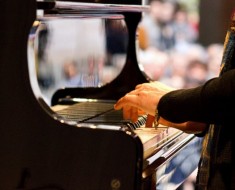We are just back from a short visit to Amsterdam, for me a nostalgic return to a city where I had a number of enjoyable breaks from work in the 70’s and 80’s. We came this time with the specific purpose not only of meeting with my wife’s sister who lives in the Netherlands and who hosted the visit, but also to attend a concert in the wonderful Concertgebouw given by my favourite orchestra, the City of Birmingham Symphony. Just now with their permanent conductor, Andris Nelsons they are on a European tour. They were at Madrid’s National Concert Hall later in the week and and at San Sebastian’s Kursaal on the 23rd January.
The Orchestra – as many others in this 150th anniversary year – is playing all of Mahler’s symphonies and yesterday’s programme concluded with an electric performance of his first, known as the ‘Titan’, named after a novel by Jean Paul and composed between 1884 and 1888. The work demands an unusually large orchestra and there are many hints in the work of what was later to come from the composer’s fertile and original mind.
As I have noted before, Nelsons almost throws himself at his players : on its own merit, never mind the sound, the energy of his conducting would commend whatever music he conducts! He doesn’t just conduct (‘just’!); he inhabits the music. It was a dramatic and beautifully prepared performance of this early work, benefitting from the rich acoustic of this glorious hall. The audience rose to their feet- a common practice at this venue- in a great ovation for a wonderful performance, the orchestra at its considerable best.
The first half of the concert has been devoted to Rachmaninoff’s 3rd. concerto. I have a recording of the work played by the soloist on Wednesday evening, the cool but totally involved Nikolai Lugansky. As it happened I read a review of his recent concert at London’s Queen Elizabeth Hall a few days beforehand in which Stephen Pritchard refers to his ‘consummate technique, allowing him to treat the torrent of notes as though he were sweeping a few crumbs from the keyboard’.
He does seem to have an almost nonchalant manner and yet there is immense passion in his playing, certainly on this occasion. It was a memorable performance, reaching its heart-catching apotheosis in the last movement and, as with the symphony, Lugansky had a standing ovation, which he acknowledged by playing a simple but lyrical encore.
It was a wonderful evening; an immense privilege to be there.
B.R.



